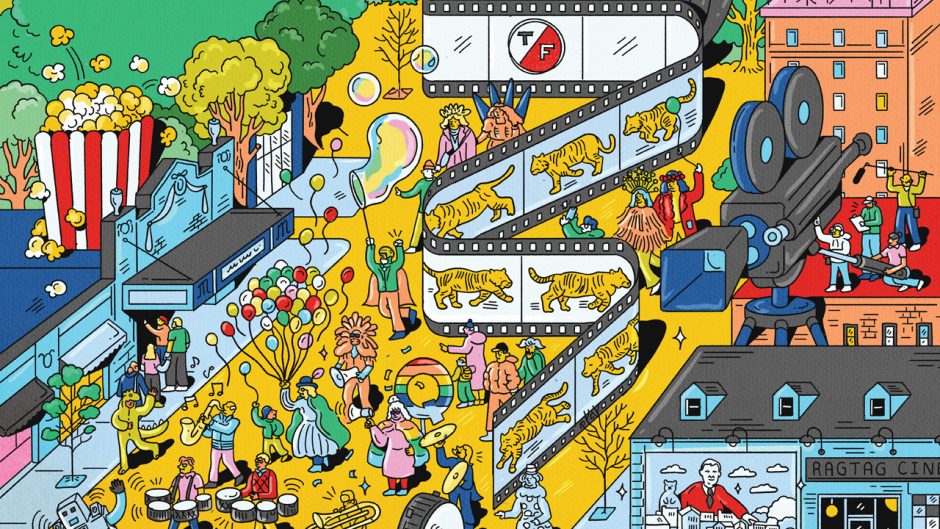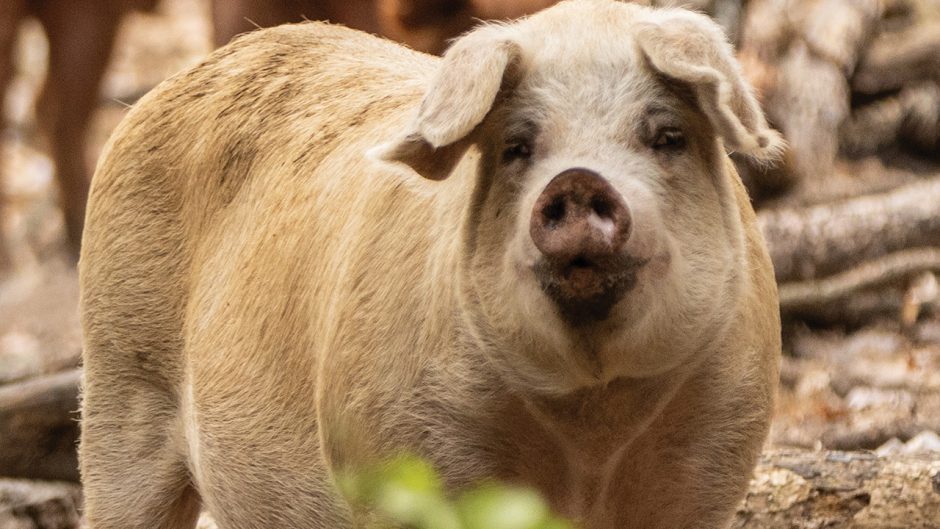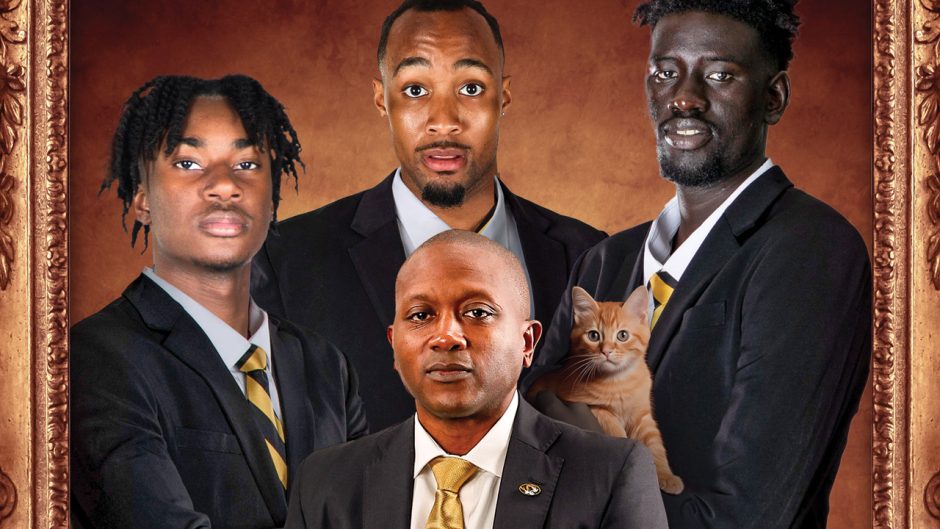Halfway through her college studies, a J-School student walks into a bar and falls in love with stand-up comedy. Because you can’t major in comedy, we asked Marina Shifrin to tell us: What is the career path of funny, and what, in the end, does it have to do with college?
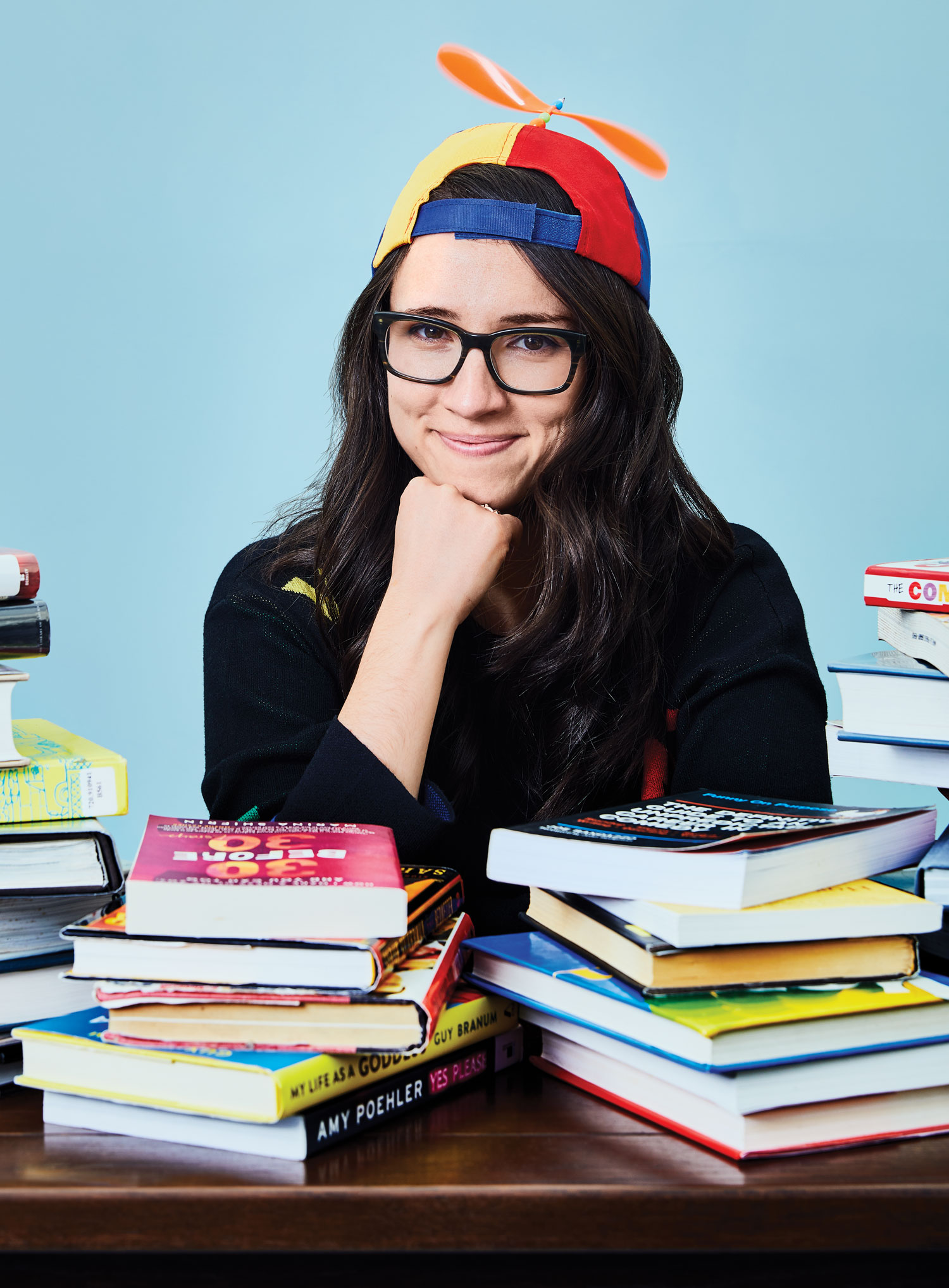
Marina Shifrin’s collection of essays, 30 Under 30: How I Made a Mess of My 20s, and You Can Too, was published in 2018. Photo by Aaron Fallon.
I was 30 years old and living in Los Angeles when my career started over… again. I consider the start of career number three as the day a book arrived in my mailbox. As I surveyed the rushed handwriting on the package, my neighbor’s chihuahua-piranha mix began nipping at my ankles. I protectively pressed the thick manila envelope to my bosom, hissing at the dog as I passed.
Safely back inside my shoebox-sized apartment, I grabbed scissors and sank into the couch where I’d spent much of the past year avoiding things like sunlight, exercise and conversations starting with, “So, what have you been up to?” I incised the squishy envelope, and, with the delicacy of a neonatal nurse, gently removed the book from its padded case. White and orange letters stood out on the wine-colored background. I ran my fingers down to the title, subtitle and blurb, finally landing on the bottom of the cover to find my name. Inside the pages of that book lived a collection of vulnerable essays comedically detailing the hits and (many) misses of my riotous 20s. The essays were terrifying to write — and even scarier to publish.
With the book’s spine pressed into my palm, I flipped through all 318 pages, inhaling the intoxicating processed-tree smell. Sitting in the stillness of my apartment, holding my first book, I sighed. “Here we go,” I quietly said to no one.
For many people, the outline of their career begins to take shape in college. I am no different. I vividly remember my first moments as a freshman, feeling the tense anticipation of what’s to come, feeling the palpable opportunities at my door, feeling like I’d just been hit by a truck. The last one most likely due to the fact I was actually hit by a truck.

Shifrin gushes to friends, family and fans at her 30 Before 30 book launch party in Los Angeles. Photo by Kyle Espeleta.
It happened in the summer of 2006, during the last 10 minutes of my seven-hour trek to the University of Missouri from Boring Suburb, Illinois. I’d been sleeping off a late night of goodbyes, stretched across the back seat of my minivan when my dad called me up to the front. I was the first person in my immigrant family to go to college in the U.S., and he didn’t want me to miss my introductory moments as a freshman.
So, I crawled over my worldly possessions, packed into the middle of the van like Tetris pieces, and plopped into the front seat. As we took the exit off of I-70, a man driving an 18-wheeler behind us fell asleep. An odd time to take a nap if you ask me. He lost control of his truck and drove through my beloved Nissan Quest minivan. The windows blew in. The tires blew out. And the car lurched forward. We slid past our exit, naked axles scraping across the asphalt. My minivan was totaled. We, luckily, were not.
I was crushed about the loss of what my friends lovingly referred to as “The Shaggin’ Wagon.” My car got that nickname because it looked like it was decorated by a disgruntled Austin Powers set designer; quintessential fuzzy dice hung from the mirror and a zebra cover hugged the steering wheel. My drug-resistant acne and gun-toting Soviet father made sure that no actual shagging was had in that wagon.
The minivan was more than just transportation — it was my temple. The middle seats were removed, creating a roomy, most likely illegal space where teenagers piled inside during restless suburban nights. My friends and I spent hours in the cavernous van eating Milky Ways, drinking AriZona iced teas and waxing poetic about the future. An endless assault of big ’n’ scary questions infiltrated the pheromone-filled air: Who will I be? What will I do? Where will I go? The future never felt as close as it did that summer after high school.
Answering those types of questions about your future is nearly impossible when you’re as indecisive as I am. I always felt as if I was looking at my adult life through a View-Master. There was a grainy image of me as a teacher. Click. Now I was a lawyer. Click. Now I was a politician. Click. Now I was a bartender. Click. Now I was a teacher again.
As my friends began applying to colleges, I felt pressured to settle on one of the many nebulous careers I’d fantasized about. My vocational interests at the time included a local radio personality named Roe Conn, waitressing and gossip. Only one of those things was something I could study in college, so I settled on a degree in gossip. Just kidding, I wish. I chose journalism.
Right around the time I should have been walking through the J-School arch, I was instead standing in the middle of I-70, with bits and pieces of my teenage sanctuary littering the roadway. I began to wonder if maybe I’d made a mistake. Click. Maybe I should be a bartender.
That first night at Mizzou, as I changed into my pajamas, tempered glass fell from my underwear and onto the green-tiled dorm room floor. I crawled into the bottom bunk, turned to my “Monkey in Headphones” poster and began to cry.
To distract myself from the accident and horrendous homesickness, I threw my mind, body and soul into classes. The more I studied, the more excited I got about journalism. My dorm was packed with other journalist wannabees, making it easy to develop a sense of kinship with the people on my floor. We did everything together: eat, sleep and even shower. I still miss having echo-y conversations in shared bathrooms. I loved living in the dorms so much that I spent the next three years working in Residential Life.
As my mind expanded in lecture halls and discussion sections, a bigger lesson unfolded outside the classroom: I discovered that I was funny. Like really funny. I’d spent most of my teen years too angry at the awkward and misshapen way my body was developing to notice that I had a sharp tongue, rapid wit and jokes coursing through my blood.
The first hints of humor began with my job as a peer adviser. Standing in the middle of Lathrop Hall’s common area, looking out over a group of more than 70 fidgety freshmen, I addressed the room with a small joke. “Hi, my name is Marina, like where you park a boat.” Then I heard something incredible: 70 people laughing in unison. It wasn’t fall-out-of-your-chair laughter but rather more of a good-natured chuckle. I didn’t care. I wanted to hear it again. This was my first audience. Sure, it was a captive bunch of 18-year-olds who didn’t want to hear about fire drills or our zero-tolerance policies, but it didn’t matter. The powerful feeling of undivided attention began to infect my brain.
Soon, I began craving a real audience, not one that had been lured to me with pizza bribes. So, I tried stand-up. Ugh, that makes it sound like an easy, breezy next step. In reality, it took nearly three years to go from thinking about stand-up to actually taking the stage.
The nice thing about living in The Mizzou Bubble is that it’s soft, delicate and well-connected — a perfect place to explore nagging interests. I soon found out about Eastside Tavern’s The As Yet Unnamed Comedy Show, whose host, Dan Friesen, was eager for comedians of all shapes, sizes and backgrounds. After a few weeks of standing in the back of the bar, I worked up the courage to approach Dan. He said he’d give me five minutes, and if I did well, I could do seven minutes the next week.
Eastside wasn’t like the other CoMo bars mostly co-opted by the tanning-bed bods of Greek Life. It was a smoky dive where comic book nerds sang karaoke, straight-edge kids threw dance parties and dramatic, artsy weirdos tried their hands at comedy. It was easy to disappear in the dark corners, what with their dim lighting and creature-feature posters. Mike Myers, Chuckie, Freddy Krueger and other horror movie monsters hung overhead, watching the debauchery below. There was so much to look at, your eyes never landed anywhere for long — except when someone inhabited the stage, the small but well-lit perch I soon came to think of as the eye of the horror hurricane.
I have yet to find another bar like Eastside, one that simultaneously makes me feel so close to invisibility and even closer to exposure.

Shifrin grips the microphone for dear life in 2009 during her first stand-up set at the now-defunct Deja Vu comedy club in Columbia. Courtesy Marina Shifrin.
And so, on the second Tuesday in September of 2009, I willingly entered the vortex of the horror hurricane. The attendance at Eastside was about a tenth of the size of what I was used to in the dorms, but I didn’t care. Those people came to hear my jokes … probably not my jokes, but still, they were a real live comedy audience. As per local tradition for first-timers, Dan instructed the crowd to boo me. Unintentionally — or maybe a little intentionally — this forced me to step into a living nightmare.
“This is really exciting for me,” I ventured as the boos died down, “I’m used to telling jokes into a hairbrush.” I began pantomiming brushing my hair with the microphone. The audience fell silent. Behind me, Dan whispered something to the DJ that made her laugh. My throat shriveled up, and I considered hurtling my body out the window. With enough force, I can make it onto Broadway, I thought.
I began vamping. “Let’s see, what did I want to talk about?” Tightening my grip on the mic cord as if it could pull me to safety, I hid behind the comfort of a joke I’d been telling my residents for years. “I met a girl who had a lily tattoo on her foot, and when I complimented her on it, she said, ‘Thanks, it’s a lily because that’s my name.’ That’s so cool. My name is Marina. I can’t get a harbor tattoo on my foot … ‘Thanks, it’s a marina because that’s my name.’ ”
A smattering of giggles rippled through the audience. I continued. “As a Russian person, I’ve grown so tired of the stereotype that all we do is sit around drinking vodka all day. That is not true. We don’t just sit around drinking vodka … we drink tequila and whiskey, too.” Giggles turned into laughter. Dan let out a small “Ha!” and put a cigarette into his mouth. I loosened my grip on the mic cord.
My next joke was about my dad: “My friends ask me how I have the courage to try stand-up. You guys have to realize that I grew up in the suburbs with a Soviet father. He wore a speedo to the local water park. When there’s a thin piece of material separating you from your father’s sausage and eggs, nothing ever scares you again.” Laughter exploded from the audience, and this time, it was followed by an applause break.
At the end of the night, Dan invited me back to perform the next week and then the week after that. I began doing stand-up at Eastside every Tuesday, occasionally fitting in gigs at dance-comedy club hybrid Déjà Vu. Both venues offered generous college crowds and weekly opportunities to hone material. My set began to evolve as I grew more confident on stage. A few months later, my jokes had beats, tags and segues: “My parents really want me to settle down, so they sent me this Jewish dating site. I’m not sure if you’ve heard of it … it’s called LinkedIn.”
Amid the cheap drinks, monster posters and bighearted laughter, a small shift occurred within me. So slight, in fact, that I barely felt it. I ignored the sensation and continued to do so for the next four years. Instead, I graduated from Mizzou and began job hunting. It was imperative that my work title match what was written on my diploma because if it didn’t, then, well, what did all that effort amount to?
After a lengthy search, I managed to secure a financial reporting job at an unknown blog in Brooklyn. My employers were impressed with my degree from Mizzou and willingness to move to New York despite the essentially nonexistent salary. Even though I knew nothing about finance and was barely getting paid, it was a relief to have a job in journalism.
So, how did I go from budding journalist in Brooklyn to first-time author in Los Angeles? To begin, I failed as a journalist. The starting gun sounded, and I immediately tripped over my shoelaces. After a year as a reporter, I still wasn’t making enough money to survive in New York, so I quit to pursue a more creative job. If I wasn’t going to make money, I was at least going to try to have some fun.
A few months into trying to have some moneyless “fun,” I caved and began looking for journalism jobs again, stumbling upon a listing looking for a “Journalist with a sense of humor.” Instead of a cover letter, I offered up videos of myself doing stand-up and was hired almost immediately. And so began my stint in one of the strangest positions I’ve ever had. My main responsibility consisted of writing scripts based on trending news stories. Simple enough. However, my scripts were then translated into Chinese, animated and uploaded to YouTube. My official title — international content editor — made me feel cosmopolitan and important, like a modern-day Murphy Brown. The job was odd, creative and still fell under the umbrella of journalism, which made it feel like all my interests and dreams collided into one perfect position. A six-week visit to the company headquarters in Taipei persuaded me to leave New York and move to Taiwan. My future, it seemed, belonged in Asia.
I have since learned the harsh lesson that buzzy job listings touting free beer and an office gym may well be hiding an otherwise horrendous work environment. But at 24, I was too naïve to see the monsters lurking in the corners of the corporate life. These weren’t as easy to spot as the ones plastered to the walls at the Eastside Tavern. As my responsibilities increased, I started noticing unsavory personnel and business practices at the company. Soon, the gnawing feeling that I’d chosen the wrong career began to envelop my entire being. For years, I’d had one foot in the journalism world and one foot in the comedy world. At this job, those worlds began to drift apart. I can’t do the splits, so I had to choose one.
On Sept. 29, 2013, I posted a YouTube video in which I quit my job: I danced across pristine desks and empty cubicles. I shimmied in bathroom stalls and skanked (it’s a dance, I promise) under a digital clock reading 4:29 a.m. My arms flung wildly from side to side as I lived out the dream that everyone in a merciless job has had at one point or another.
I spent the week prior cleaning up my digital footprint, creating a website and posting samples of my best work. Even though I expected no one to see the video, I prepared for everyone to see it. Because the internet, like Eastside, can make you feel so close to invisibility and even closer to exposure.
The day after I posted the video, the view count climbed to a couple million. Before I could process what was happening, I was flown out to Los Angeles to do the talk show circuit, starting with The Queen Latifah Show and ending with Today. Before each appearance, producers asked what I wanted my lower-third to read. “Comedian,” I sheepishly replied as makeup artists hustled to hide my subtle mustache from the unforgiving studio cameras.
Just like that, I pulled the emergency brake on my journalism career and screeched into the world of comedy. Click. Now I’m a comedian. By the time the excitement was over and my video waned, a few months later, it had received over 19 million views. I spent those few months answering tens of thousands of emails and setting up interviews with strangers who were curious to see if I was as crazy as the internet made me seem. (I’m not, I don’t think.) One of those interested strangers was a talent manager who insisted I move to Los Angeles. Click. Now I’m in Hollywood.
The decision to start over was a hard one. I knew if I wanted a fighting chance for a life in comedy, I had to pay my dues. I spent the next four years working entertainment jobs where my main responsibilities included pouring coffee, resetting the Wi-Fi and wrestling copiers. In between taking notes and lunch orders, I was occasionally asked for joke or segment ideas. In those fleeting moments, I began to prove myself as a comedian. Slowly, glacially rather, I began to get offered writing jobs on comedy shows. I wrote for a lot of incredibly smart and hilarious people, and then I wrote for myself. This writing led me to sell a book of essays based on my experiences as a rambunctious and insatiable 20-something — a possibility I never imagined when I was making those big ’n’ scary career decisions as an 18-year-old. After that, the opportunity came along to option that book for television. And now, as is customary in Hollywood, I wait to see what happens next, my future just as indefinite and exhilarating as the day I left for college.
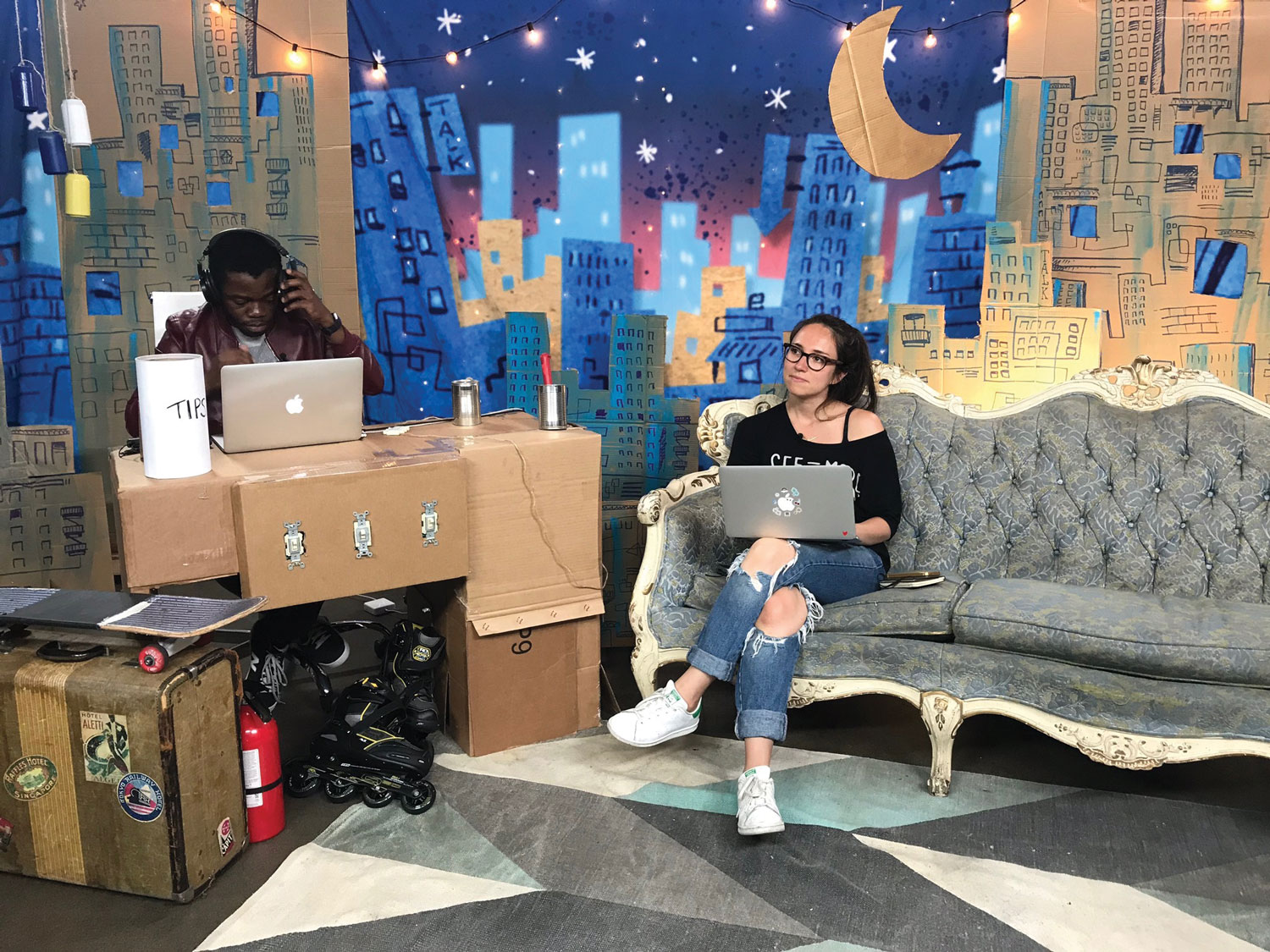
Shifrin with friend and comedian Demi Adejuyigbe on the set of “Talk Show Talk Show,” a program they co-created that is in preproduction. Courtesy Marina Shifrin.
I never would’ve expected Columbia, Missouri, to be at the heart of my journey as a comedian, but that’s where I found my voice and figured out how to use it. It turns out, in addition to homework assignments, projects and tests, college is also about sneaking kisses between the Columns, mixing cereals at Plaza 900, free pizza, gawking at people confident enough to lay out in their bathing suits at the rec center, more free pizza, burning bagels in the dorm microwave, study sessions with your crush, quieting your caffeine buzz at Ellis, taking photos of Memorial Union (she always looks so dang pretty), wearing sweatpants in the snow and unexpectedly discovering what makes you tick as a human. These collegiate moments and countless others contributed to my evolution from angry teenager to funny lady. It turns out not pursuing what you studied in college doesn’t mean that you can’t still apply what you’ve learned in college. Oh, how I wish I’d known that earlier.
Opening the package containing my first book made the future feel clearer than ever. Click. Author. Holding my tangible words gave me the kind of nervous excitement that I had at the beginning of my time at Mizzou — back when uncertainties of the past melted away to expose endless opportunities ahead.
I’ve stopped trying to figure out which direction my life will go. There’s no use. I’ve realized that sometimes the road to success lays outstretched before you, and other times a truck wallops you from behind. Either way, you should always wear your seat belt and never try to predict what the future holds.

Shifrin began her stand-up career while a student at the Missouri School of Journalism. Photo by Aaron Fallon.
To read more MIZZOU magazine stories online, visit mizzou.com.

